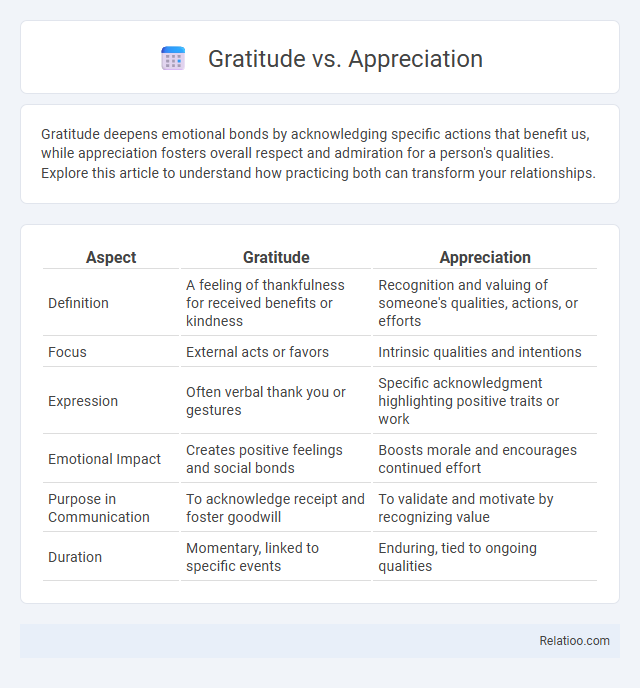Gratitude deepens emotional bonds by acknowledging specific actions that benefit us, while appreciation fosters overall respect and admiration for a person's qualities. Explore this article to understand how practicing both can transform your relationships.
Table of Comparison
| Aspect | Gratitude | Appreciation |
|---|---|---|
| Definition | A feeling of thankfulness for received benefits or kindness | Recognition and valuing of someone's qualities, actions, or efforts |
| Focus | External acts or favors | Intrinsic qualities and intentions |
| Expression | Often verbal thank you or gestures | Specific acknowledgment highlighting positive traits or work |
| Emotional Impact | Creates positive feelings and social bonds | Boosts morale and encourages continued effort |
| Purpose in Communication | To acknowledge receipt and foster goodwill | To validate and motivate by recognizing value |
| Duration | Momentary, linked to specific events | Enduring, tied to ongoing qualities |
Defining Gratitude and Appreciation
Gratitude is the heartfelt recognition of kindness received, often expressed as a deep sense of thankfulness toward someone or something. Appreciation involves acknowledging the value or significance of a person, action, or object, highlighting the qualities that make it meaningful beyond mere thanks. Your ability to distinguish between gratitude and appreciation enhances emotional intelligence and fosters stronger personal and professional relationships.
Core Differences Between Gratitude and Appreciation
Gratitude is a deep emotional response to receiving a benefit, often linked to a sense of thankfulness toward a specific person or event, whereas appreciation is a broader recognition of value or quality, which may not always involve an emotional component. The core difference lies in gratitude being an active feeling that motivates reciprocation or acknowledgment, while appreciation can simply be an intellectual acknowledgment of worth or excellence. Understanding these nuances helps in effectively expressing positive recognition in personal relationships and professional settings.
Psychological Impact of Gratitude
Gratitude significantly enhances psychological well-being by promoting positive emotions, reducing stress, and improving overall mental health through fostering a mindset of thankfulness. Unlike general appreciation, gratitude involves a deeper recognition of benefits received, which activates neural pathways associated with reward and social bonding in the brain. Empirical studies in positive psychology confirm that practicing gratitude consistently leads to increased life satisfaction and lower symptoms of depression and anxiety.
Emotional Benefits of Appreciation
Appreciation fosters emotional well-being by enhancing your sense of connection and positivity toward others, creating a powerful feedback loop that boosts happiness and reduces stress. Unlike gratitude, which is often a response to kindness received, appreciation involves recognizing the value in everyday experiences and qualities, promoting mindfulness and emotional resilience. This conscious acknowledgment supports mental health by encouraging a deeper sense of fulfillment and emotional balance.
Daily Practices to Cultivate Gratitude
Daily practices to cultivate gratitude include journaling specific moments of appreciation, which enhances your awareness of positive experiences and shifts focus from what is lacking to what is abundant. Incorporating mindfulness and deliberate reflection on acts of kindness fosters deeper appreciation and strengthens emotional well-being. Consistent gratitude exercises, such as expressing thanks to others, reinforce positive neural pathways that promote sustained happiness and resilience.
Ways to Foster Genuine Appreciation
Fostering genuine appreciation involves actively recognizing specific actions or qualities in others and expressing sincere acknowledgment without expectation. Practicing mindfulness and reflecting on positive experiences enhances awareness, making gratitude a heartfelt response rooted in genuine connection rather than obligation. Creating daily rituals of expressing thanks and focusing on the impact of others' efforts cultivates a lasting attitude of appreciation beyond superficial politeness.
The Role of Mindfulness in Gratitude and Appreciation
Mindfulness enhances gratitude by fostering present-moment awareness, enabling individuals to recognize and value positive experiences deeply, which differentiates it from simple appreciation that may lack this depth. Practicing mindfulness cultivates a deliberate acknowledgment of both significant and subtle blessings, intensifying emotional responses tied to gratitude. This heightened awareness supports sustained well-being by reinforcing positive cognitive patterns associated with gratefulness rather than transient feelings of appreciation.
Gratitude vs. Appreciation in Relationships
Gratitude in relationships involves recognizing and feeling thankful for the kindness and support received, fostering emotional connection and trust. Appreciation goes beyond gratitude by actively expressing admiration and valuing the partner's qualities and actions, which strengthens mutual respect and intimacy. Both gratitude and appreciation contribute to relationship satisfaction, but appreciation often drives ongoing positive behaviors and deeper emotional engagement.
Overcoming Challenges in Expressing Gratitude or Appreciation
Overcoming challenges in expressing gratitude or appreciation often involves recognizing subtle differences between the two: gratitude implies a deeper emotional acknowledgment of kindness received, while appreciation highlights valuing qualities or actions. Effective communication of gratitude can be hindered by cultural norms, personal insecurities, or fear of vulnerability, making intentional practice essential. Developing consistent expressions of appreciation fosters positive relationships and resilience amid adversity by reinforcing empathy and connection.
Integrating Gratitude and Appreciation for Well-being
Integrating gratitude and appreciation into your daily routine enhances emotional well-being by cultivating a positive mindset and fostering stronger relationships. Gratitude involves recognizing and being thankful for the good in your life, while appreciation focuses on valuing specific qualities or actions in others. Combining these practices supports mental health, reduces stress, and promotes overall happiness through intentional acknowledgment of life's blessings.

Infographic: Gratitude vs Appreciation
 relatioo.com
relatioo.com